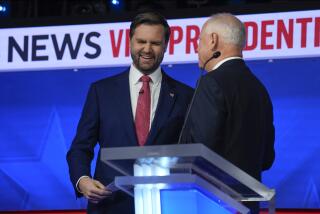The Debate: A Funeral Deferred
- Share via
SACRAMENTO — We came, quite frankly, to bury Kathleen Brown. By we I mean the press, the pack, the purveyors of conventional wisdom. Tapped into laptops, scratched down on note pads, ready and stored for quick handling, were the rough drafts of eulogies to a curiously stillborn campaign.
Friday night the funeral was to begin. Everybody knew the ritual. Brown would enter a public television studio and debate Gov. Pete Wilson for one hour. She would give one of her off-key, minimalist performances, demonstrating anew why she had fallen 13 poll points behind. Wilson would be Wilson, a passable if unexciting mix of ex-Marine and Statehouse wonk. Brown’s last hope to resurrect her campaign would go unrealized.
“Can you tell us,” the debate panelist asked right away, sensing the kill, “just where your campaign has gone wrong?”
“My campaign,” she replied, “has only begun.”
And there was the hitch. Brown had not been told that her campaign was about to be put out of its misery. She not only showed up alive and kicking, she departed wearing the grin of Lazarus, a corpse that wouldn’t stay in the coffin. If only for one night, Brown performed like the candidate so many people thought they saw a year ago, when they all but smothered the Democrat with golden expectations.
*
She was sharp, poised, aggressive. By contrast, Wilson rarely got off his heels. He muddled and stammered and tossed around numbers like a hyperactive statistics professor. The debate topics were predictable--immigration, economics, crime. Wilson, the wisdom had it, “owns” these issues. If so, he let Brown borrow them for the evening.
Immigration became a discussion of Wilson’s inconsistencies, comparing his advocacy in the U.S. Senate for more seasonal pickers to his more strident rhetoric of today. Instead of heartily embracing Proposition 187 for what it is--a strategy to chase out undocumented Mexicans--the governor instead took the equivocal, weak-sounding line that he supported it only as a means to trigger a lengthy and costly legal challenge. And so much for tort reform as the next big Republican issue.
Economic debate was framed around Brown’s 62-page booklet, “Building a New California.” Wilson challenged the notion that it constitutes an “economic plan,” deriding it as a mere “pamphlet.” Still, plan or pamphlet, Brown’s booklet was the only one on the table. What Wilson might intend for a second term, incredibly, never came up as a topic.
The most startling reversal, though, involved crime. Wilson has made an art of standing grimly beside crime victims while the cameras roll. The implication behind the image is empathy--that Wilson gets it on crime, and his opponent does not. On Friday night, in a moment her advisers insisted was spontaneous, Brown stepped on Wilson’s favorite photo op.
“What I resent most of all,” she said, pivoting to engage the governor, “is you questioning, questioning my commitment to be tough on crime. You cannot possibly imagine what it’s like to be a woman, at night, leaving the office, going to your car at night, worrying about your safety. And you cannot imagine what it’s like to be a mother, waiting at home late at night for your kids to come home--waiting for your daughter to come home in the evening, and having her come home and comfort her because she’s been raped.”
*
Except for this disclosure about a daughter’s date rape, much of what Brown said in the debate was not new. Rather than her text, it was her delivery, her bearing, that seemed most transformed. For once, she did not appear to be searching for pitch, straining to remember scripted sound bites. She was Kathleen Brown, rather than Kathleen Brown, candidate. It made all the difference. She won the debate, and she cheated the obituary writers.
The question now is can she build on the success. There was new wisdom passed about in the post-debate klatches. Brown, it was said, had failed to deliver the knockout punch she needed. Such analysis seemed a bit overextended. Debate victories, no matter how lopsided, almost never move great blocs of voters fast. What they can do is solidify support, open some minds and reorder the political debate. What they can do, too, is revise the story line.
This, more than anything, is what Brown accomplished Friday night. She canceled for now any post-mortem analyses of her campaign. She ensured that the last weeks before the election will be covered, not as a funeral march, but as a chase: Can she catch Pete Wilson? She entered the debate a presumed corpse and emerged a still viable candidate--an underdog, but still in the hunt. It was no small feat. Ask Lazarus.
More to Read
Get the L.A. Times Politics newsletter
Deeply reported insights into legislation, politics and policy from Sacramento, Washington and beyond. In your inbox twice per week.
You may occasionally receive promotional content from the Los Angeles Times.











